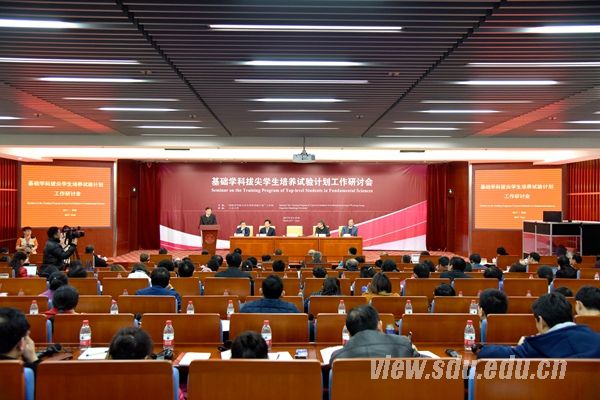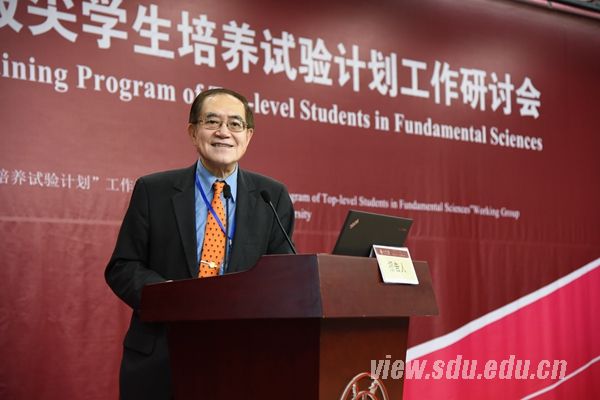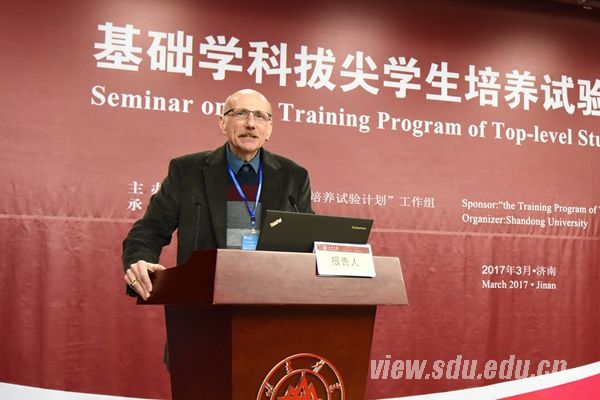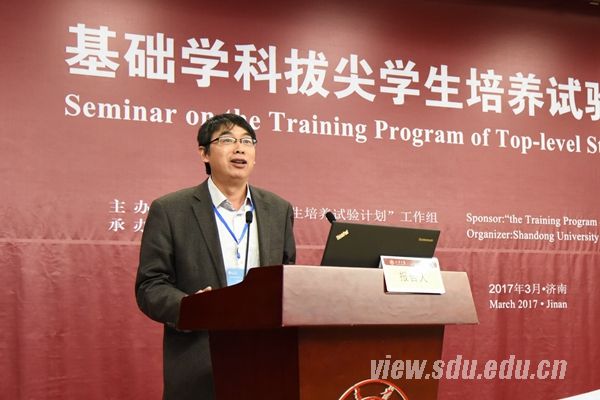
On March 25, the seminar on the training program of top-level students in fundamental sciences sponsored by the Ministry of Education and hosted by Shandong University, was held in the central campus.
Zhang Daliang, Director of the Department of Higher Education of the Ministry of Education, Peng Shige, academician of the Chinese Academy of Sciences and Dean of Shandong University Taishan College, Gong Shouliu, leader of Shandong Provincial Education Department, and Hu Jinyan, vice president of Shandong University attended the seminar.

Zhang Daliang, Director of the Department of Higher Education of the Ministry of Education (middle), Gong Shouliu, leader of Shandong Provincial Education Department (first on the right), Hu Jinyan, vice president of Shandong University (first on the left) addressed the opening ceremony; Peng Shige, academician of the Chinese Academy of Sciences and Dean of Shandong University Taishan College (second on the right) made the concluding remarks
Zhang Daliang addressed the opening ceremony. He said that with the world experiencing a new round of scientific and technological revolution and industrial transformation, we must conscientiously implement the essence of President Xi Jinping's speech which goes "We shall follow the forefront of world science and technology, comprehensively enhance the ability of independent innovation, and strive for major innovation in basic sciences and breakthroughs in key areas of core technologies" to cultivate first-class talent. The "top-level students" pilot colleges and universities at present have formed an effective mechanism, arousing widespread concern in society. 96% of the first four years’ graduates of the Top-Level Program chose to pursue postgraduate education, 65% of whom entered the top 100 internationally renowned universities and 10% entered the top 10 universities in the world. He said in the next stage, we should continue to optimize the top-level and innovative talent training mechanism with Chinese characteristics to create a group of world-class scientists and technology leaders in the future.
Gong Shouli briefed on the personnel training in Shandong Province. He said that at present, Shandong Province, with full implementation of the provincial party committee’s and government’s views on promotion of higher education reform, has started carrying out a series of programs including the "double first-class" and construction of high-level applied universities. In the future, Shandong Province will promote the construction of local colleges and universities to speed up construction of innovative provinces and strong economic and cultural provinces. Hu Jinyan introduced the current situation of undergraduates training in Shandong University, especially the training achievements of Shandong University Taishan College. He said that Shandong University cherishes the opportunity to participate in the national training program of top-level students in fundamental sciences very much. With profound understanding of the historical responsibility, Shandong University will present a system layout for future development of undergraduate education, ensure full implementation with courage and action and achieve transition of undergraduate education from scale expansion to quality improvement.





Chung K. Law, Academician of the US National Academy of Engineering and Professor of Princeton University, gave an in-depth analysis of the objectives and training models of Princeton University and the advantages and problems of personnel training in Chinese universities at this seminar. Prof. Brian P. Coppola of the University of Michigan expressed his thoughts on relation between finding and cultivating talents. Qian Zhongmin, tenured professor of University of Oxford briefed on Oxford’s unique residential system and management model. Prof. Dr. Guillaume Olive from University of Bordeaux, France, introduced to participants the status quo and experience of French elite talents training.
In his concluding remarks, Academician Peng Shige said that in his long-term research work, he felt that the importance of undergraduate education for the cultivation of talents was very much in line with the relevant measures mentioned by Mr. Zhang Daliang. He said that our country's top-level students training program is designed to train top-level students as early as possible and to create conditions and reduce obstacles for students interested in science as much as possible. He explained that the French teaching system is very similar to that of China. We should study the excellent teaching philosophy of foreign schools, and be confident that we can do as well as them.

At the seminar in the afternoon, Wu Zhen, Vice President of Taishan College introduced the unique practices and training achievements of Taishan College over the past seven years. Prof. Shi Jinghuan of Tsinghua University reported on the research results of top-level innovative students training model in China's universities. Finally, colleges and universities in or in not the top-notch innovative talent training program discussed on their 2017 work plans.
Relative staff from Department of Higher Education, Ministry of Education, Shandong Provincial Education Department, National Top-notch Program Discipline Committee and more than 140 representatives from over 40 domestic and foreign colleges and universities such as Princeton University, University of Michigan, University of Oxford, University of Bordeaux, Peking University, Tsinghua University etc. attended the meeting.
Source:www.view.sdu.edu.cn
Translated by: Song Yijun
Photo by: Zhang Dandan, Chen Tingting
Edited by: Zhao Aiping, Lang Cuicui